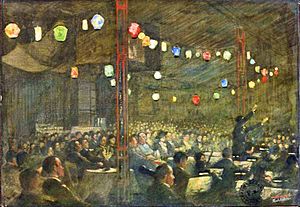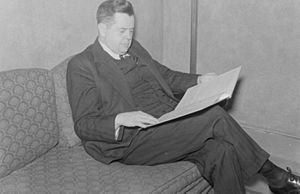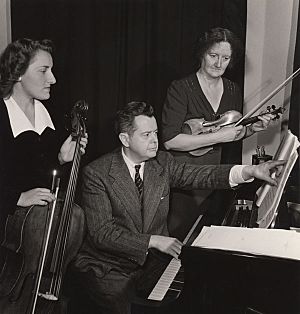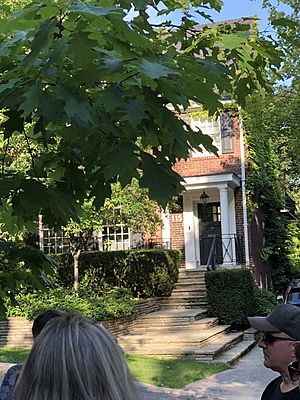Ernest MacMillan facts for kids
Quick facts for kids Ernest MacMillan |
|
|---|---|
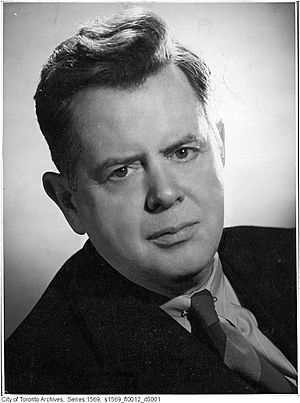 |
|
| Background information | |
| Birth name | Sir Ernest Alexander Campbell MacMillan, CC |
| Born | August 18, 1893 Mimico (Etobicoke), Ontario |
| Died | May 6, 1973 (aged 79) Toronto, Ontario |
| Occupation(s) | Composer, conductor, administrator, lecturer, adjudicator, writer, humourist, statesman |
| Instruments | Organ |
| Years active | 1919-1973 |
Sir Ernest Alexander Campbell MacMillan (August 18, 1893 – May 6, 1973) was a famous Canadian musician. He was a talented conductor, composer, and organist. People called him Canada's "Musical Knight" because of his important work.
From the 1920s to the 1950s, many saw him as Canada's top musician. He helped music grow in Canada in many ways. He conducted orchestras, performed, composed, taught, and even lectured about music.
Contents
Ernest MacMillan's Life Story
Early Years and Learning (1893–1914)
Ernest MacMillan was born in Mimico, Ontario, near Toronto. His parents first introduced him to music. He loved watching his mother play the piano from a young age.
In 1898, his family moved to a new house. His father, a minister, bought an organ for their home. Ernest was completely hooked on music after that.
He started organ lessons at age 8 with Arthur Blakely. Ernest was a child prodigy, meaning he was super talented very young. He gave his first organ concert at just ten years old. In 1904, he amazed everyone at the "Festival of Lillies." About 4,000 people came to see him play.
Ernest also became the organist at St. Enoch's Church. This gave him great experience playing for singers. From 1908 to 1910, he worked as an organist and choirmaster at Knox Church in Toronto. He gave his first official organ recital in 1910.
He earned special diplomas from the Royal College of Organists. From 1911 to 1914, he studied history at the University of Toronto. He earned a Bachelor of Arts degree there.
Time in Germany During WWI (1914–1919)
In 1914, Ernest MacMillan went to Paris to study piano. He then visited Bayreuth, Germany, for a music festival. But World War I started in August that year.
Because Canada had declared war on Germany, MacMillan was arrested. He was held as an "enemy alien" for the whole war. He stayed at Ruhleben internment camp, a camp for civilians near Berlin.
At the camp, he became a key member of the Ruhleben Musical Society. He helped put on shows like The Mikado and Cinderella. He even wrote down the music for The Mikado from memory!
MacMillan also joined the Ruhleben Drama Society. He acted in plays like Othello. He gave talks about Beethoven's symphonies. After each talk, he and another musician would play the symphony on piano.
Years later, MacMillan shared his camp experiences in interviews with CBC.
Ernest MacMillan's Career Highlights
As a Conductor
After returning to Canada in 1919, MacMillan became organist and choirmaster at the Timothy Eaton Memorial Church in Toronto. He was famous for his performances of Handel's Messiah.
His conducting career truly began in 1923. He led a performance of Bach's St. Matthew Passion. He conducted this work every year for the next 30 years! He also started the tradition of the Toronto Mendelssohn Choir performing Handel's Messiah at Christmas.
MacMillan achieved many great things with the Toronto Symphony Orchestra. During the Great Depression, he changed concert times to the evening. Many theatre musicians were out of work then. MacMillan hired them to play regularly in the orchestra. This made the orchestra stronger and allowed them to play more challenging music.
He also made concerts fun. For Christmas concerts, he would dress as Santa Claus! He even once conducted with a monkey wrench instead of a baton.
During and after World War II, his conducting was very successful. He added Canadian music to the orchestra's shows. He also introduced music by Hungarian and Russian composers.
MacMillan became a guest conductor in the United States during WWII. He led concerts at the Hollywood Bowl and with the NBC Symphony Orchestra. In Canada, he conducted the Montreal Symphony Orchestra and the Vancouver Symphony Orchestra. He toured Australia too, leading 30 concerts.
Later, from 1948 to 1953, MacMillan helped bring music to more people. Many of his performances were recorded and broadcast on CBC Radio.
As a Composer
While held in Germany during WWI, MacMillan wrote his most important piece. It was called String Quartet in C-minor. This music was inspired by the war. It was first performed in 1925, with MacMillan himself conducting.
Even though his compositions were praised, MacMillan preferred conducting. He said composing was not his main focus.
He was influenced by 19th-century romantic music. But he also loved folk music. In 1927, he traveled to British Columbia. He listened to and wrote down music of the Tsimshian People. From this, he created Three Songs of the West Coast.
MacMillan composed less while leading the Toronto Symphony Orchestra. Still, he wrote Scottish and French songs for an opera. He also composed two choral works: Te Deum Landamus in E Minor (1936) and Song of Deliverance (1944).
His only piece just for the organ was Cortège académique. He composed and performed it in 1953 at the University College.
Besides his own works, MacMillan arranged music by other famous composers. These included Bach, Beethoven, Handel, and Tchaikovsky. He said they greatly influenced his style.
As a Performer
MacMillan became well known in Toronto for his performances. After the war, he gave five organ recitals for the Canadian Academy of Music. He also played after Sunday services at the Timothy Eaton Memorial Church. His "all Bach recitals" drew many people.
CBC Radio helped make MacMillan famous across Canada in the 1920s. He was often asked to perform in Vancouver and the United States.
In the early 1940s, MacMillan formed "The Canadian Trio." He played with cellist Zara Nelsova and violinist Kathleen Parlow. They often performed in Toronto. They even played Beethoven's Triple Concerto with the Toronto Symphony Orchestra. MacMillan also formed "The Canadian Duo" with Kathleen Parlow. Their performances were also on CBC Radio.
MacMillan gave 100 concerts and recitals between the 1920s and 1950s. He eventually stopped performing to focus on conducting and teaching.
As an Educator
MacMillan strongly believed in music education. He helped build the foundations of music development in Canada. In 1919, he joined the Canadian Academy of Music. He taught theory, harmony, piano, and organ. He also traveled to lead exams for the Academy.
Later, MacMillan became the Dean of the Faculty of Music at the University of Toronto. He made many improvements there. In 1927, he started a choir for students to gain singing experience. He also began the first opera classes in 1920. They performed operas like Hansel and Gretel. He also improved the library and created teaching materials.
MacMillan cared about music education for young people. He worked on children's concerts with the Toronto Symphony Orchestra. In 1942, he started a series called "Music for Young Folk." These 45-minute programs featured soloists and the orchestra for students of all ages.
He also became an internationally recognized music judge. He judged festivals in Canada, Jamaica, and the United States. In 1937, he was the first Canadian to judge at the National Eisteddfod of Wales.
Honours and Awards
In 1935, King George V knighted MacMillan. This was for his great "services to music in Canada." This is why he is called "Sir" Ernest MacMillan.
He became an honorary member of the Royal Academy of Music in 1938. He also received the University of Alberta National Award in Music in 1952. The Canada Council Medal was given to him twice, in 1964 and 1973. This was for his "outstanding achievements in the arts."
In 1964, the University of Toronto's Faculty of Music opened a new theatre. They named it "The MacMillan Theatre" in his honour. It can hold 815 people.
Sir Ernest MacMillan's sons, Keith and Ross MacMillan, created the Sir Ernest MacMillan Memorial Foundation. This foundation gives awards of up to $10,000. These awards help young musicians get advanced education.
Sir Ernest MacMillan passed away in Toronto in 1973.
The Sir Ernest MacMillan Memorial Foundation
The Sir Ernest MacMillan Memorial Foundation was started in 1984. Sir Ernest's sons, Keith and Ross MacMillan, began it with a family donation. Its main goal is to help young musicians with their advanced studies. This way, it honors a great Canadian and his amazing career.
Examples of MacMillan's Music and Recordings
MacMillan conducted the Toronto Symphony Orchestra in two films in 1945. In one film, they played his own composition, À St. Malo.
In 1942, MacMillan conducted the Toronto Symphony Orchestra for a recording of The Planets by Gustav Holst. During World War II, he also conducted a recording of Pomp and Circumstance March No. 2. This was the first time this piece was recorded outside the UK.
He also conducted the orchestra for recordings with famous Canadian pianist Glenn Gould. They played music by Johann Sebastian Bach and Ludwig van Beethoven.
Sir Ernest MacMillan Home
The house known as the Sir Ernest MacMillan Home was built in 1931. It was made for Ernest MacMillan and his wife Elsie in Toronto's Rosedale area. This house is now a protected heritage property.
 | Percy Lavon Julian |
 | Katherine Johnson |
 | George Washington Carver |
 | Annie Easley |


